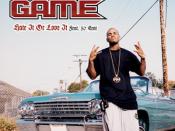We are all too familiar with the similarities between the supposed opposites, good and bad, but very few stop to examine the thin line existing between love and hate. "The truth is simple: only LOVE can conquer HATE, not some attempt to fight fire with fire or stand in a corner and wait for a promised heaven if we're good little boy and girls and eat our vegetables" (Campion).
My favorite book is The Scarlet Letter by Nathaniel Hawthorne, in which love and hate are two issues that appear indistinguishable at times. In this story, Hester wears a scarlet letter for the adultery she committed with the reverend while she was married to Roger. The details of this emerge as the story progresses, and the story culminates in the reverend passionately confessing his sin and later dies. As the quote says, love and hate "each leaves the passionate lover, or the no less passionate lover, forlorn and desolate by the withdrawal of his subject".
This basically means that the passion and feelings do not differ whether they are intended to love or hate. To love or hate a person with a passion indubitably results in the same feelings, and when the subject of these feelings disappears, the passion felt remains the same.
Hate is easy, disguised in millions of faces and excuses. Love is far more difficult; attached to conditions and crying out for restitution. In a great battle of humanity hate beats love hands down (Campion).
Hitler called it pride. Ghandi called it oppression. Manson called it fear. Freud called it sex. Dylan called it order. Jesus called it devil.
Hate has been structured, manufactured, bought and sold in a host of ways. It has seduced bigotry, war, murder, rape, and poverty. It has been run by politics,


